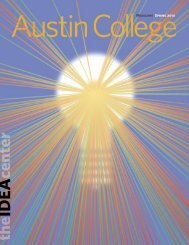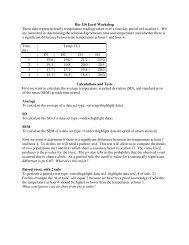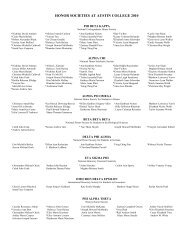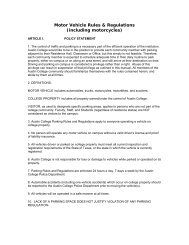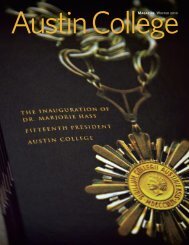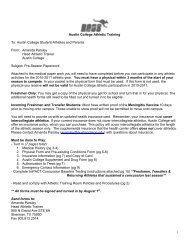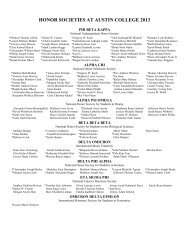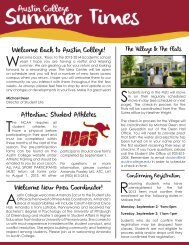MATHEMATICS AND COMPUTER SCIENCE495 Senior Conference: AdvancedStudies in Leadership(1/2 course credit unit)This course explores a range of more advancedleadership issues and concerns. Advancedstudents participate in a synthesis and personalinvestigation of their leadership effectivenessand present a formal critical reflection of theirstudies and experiences to other students andfaculty. Students will articulate a plan of actionand describe their propensity for engagementas a leader in future endeavors. This is the capstonecourse for students in the Posey LeadershipInstitute. (Each term)JANUARY TERM COURSELEAD 100: Leadership in ActionThis experiential learning course buildsupon Leadership 120. Students will developspecific skills in personal effectiveness, oralcommunication and situational awareness.Through participation in field experiments,students acquire the skill to conduct andfacilitate group action learning activities.This course is required for Posey LeadershipInstitute participants during their first Januaryterm at <strong>Austin</strong> <strong>College</strong>.MATHEMATICS ANDCOMPUTER SCIENCEMichael Higgs, chair; Kerry Brock, J’LeeBumpus, Shellene Kelley, Jack Mealy,Wilbur Powell, Don WilliamsThomas F. Kimes (Emeritus)COMPUTER SCIENCEThe computer science curriculum providesan introduction to theoretical andpractical aspects of computing. Thecurriculum addresses applications in avariety of programming languages oncurrent platforms.A major in computer science consistsof a minimum of eight approvedcomputer science course credit units,including the following core courses:Computer Science 201, 110 (if required),and 120 (if required), 211, and 221.Students must earn a grade of C orabove in each of these core courses. Inaddition, a major includes approvedcomputer science elective courses toreach eight or more course credits,of which two must be numbered 300or above, and one numbered 400 orabove. Mathematics 120 and 151 arealso required.Students with sufficient programmingexperience may not be requiredto enroll in CS110 or CS120. Studentswho plan to major in computerscience should contact theMathematics/ Computer Science Departmentas early as possible.A minor in computer science consistsof a minimum of five approvedcomputer science course credit units,including the following core courses:Computer Science 201, 110 (if required),and 120 (if required), 211 and 221.Students must earn a grade of C or abovein each of these core courses. A minormust also include two approved computerscience elective courses numbered300 or above.Interdisciplinary majors and minors arealso available.101 Introduction to Computersand Web TechnologiesA study of the basic principles of computingand the technologies used to locate and publishdigital information on the Internet. Studentswill use mark-up languages and scriptinglanguages to develop interactive web pagesand multi-page web sites. Topics will include,but are not limited to, history of the Internetand its architecture, web page construction andorganization, style sheet specification, imageand multimedia processing, and dynamic webforms development. Object-oriented programmingconcepts related to programming for theweb are also discussed.110 Introduction to Computer ScienceA study of algorithm design, implementation,analysis, and application. Introduction toCOURSES OF INSTRUCTION| 119
MATHEMATICS AND COMPUTER SCIENCEobject-oriented programming including design,testing, and documentation. Introduction tocomputer architecture, data representation, andsoftware engineering. (Each fall and spring)120 Intermediate ComputerProgrammingA continuation of principles of program designand testing presented in Computer Science110; study of simple data structures (stacks,queues, lists, and trees), and their object-orientedimplementations; object-oriented designpatterns; graphical user interfaces; recursion.Prerequisite: Computer Science 110 with agrade of C or better or permission of instructor.(Each fall and spring)201 Discrete Mathematics(see Mathematics 141)211 Core Fundamentals IA survey of the fundamental topics relating tothe design and development of contemporarysoftware systems.Topics include essentialalgorithms, computational modeling andcomplexity, knowledge representation anddata structures, search strategies, automatedreasoning, and theoretical computationalmodels. Prerequisite: Computer Science 120with a grade of C or better or permission ofinstructor. (Each fall)220 Architecture andAssembly LanguageA study of Von Neumann computer organizationand architecture and assembly languageprogramming; memory segmentation, paging,etc.; I/O and interrupt principles; alternativearchitectures; introduction to logic circuits,CPU, and memory design. Prerequisite: ComputerScience 120 with a grade of C or betteror permission of instructor.221 Core Fundamentals IIA survey of fundamental topics regarding thedesign and organization of computer systems,how they are managed or controlled, and howthey communicate in networks. Topics includeintroductions to computer organization, assemblylanguage, operating systems, and computernetworking. Prerequisite: Computer Science120 with a grade of C or better or permissionof instructor. (Each spring)250 Topics in Computer ScienceA study of selected topics for beginning studentsoffered on an occasional basis. May berepeated when topic varies.260 Intermediate Directed Study(Variable course credit)290 Practicum330 Database SystemsA system level study of bulk storage devicesand data storage schemes; database managementsystems survey; ER/OO modeling; logicaland physical database analysis, design, andimplementation; relational and object-orienteddatabase models; client/server architectures;small projects. Prerequisite: Computer Science211 with a grade of C or better. (Every otheryear - Fall <strong>2007</strong>)380 Software EngineeringA study of the software development life cycleincluding the analysis, specification, design,implementation and testing of software systems;management of software developmentprojects. Prerequisite: Computer Science 211with a grade of C or better. (Every other year -Fall <strong>2007</strong>)410 Programming LanguagesAn in-depth study of the design and implementationof high-level programming languages.Languages from a variety of programming paradigmsare presented including imperative, functional,and object-oriented languages. Formalapproaches to defining syntax and semantics areused to describe the underlying concepts. Essentialfeatures of modern programming languagesare discussed including control structures, scoperules, data types and validation, abstraction,exception handling, event handling, interpretation,and compilation. Hands-on experience withseveral programming languages will serve tosolidify the concepts presented in lecture. Prerequisite:Computer Science 211 with a grade ofC or better. (Every other year - Fall <strong>2008</strong>)412 Data Structures and AlgorithmsA study of intermediate to advanced data structures(linear structures, nonlinear structures,balanced trees and variants, graphs, heaps,etc.) and their associated algorithms, analysis,and selection criteria; introduction to algorithmtechniques (divide-and-conquer, dynamic programming,greedy algorithms, etc.). Prerequisite:Computer Science 211 and 201 with a grade ofC or better. (Every other year - Spring 2009)420 Operating SystemsModular and layered design of operating systemsincluding control of concurrent processes, synchronizationand communication mechanisms,120 | COURSES OF INSTRUCTION



